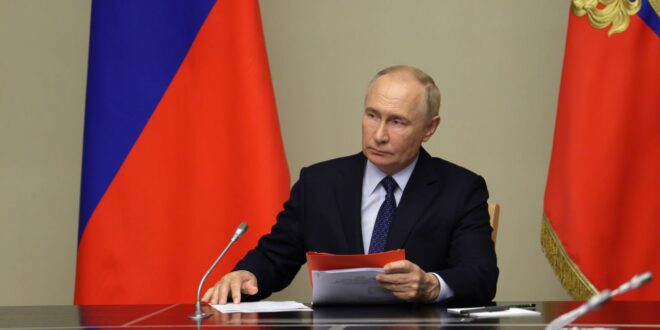The first such emergency occurred 24 years ago, when several warheads aboard the Russian submarine K-141 Kursk exploded during an undersea exercise.
COMMENTARY by Susan Katz Keating
Deep within Kursk Oblast in Russia, a special glass of tea perhaps is being brewed for some unsuspecting government official. Or perhaps a screen has been removed from a window, for when the official accidentally stumbles through the casement, and plummets to the ground below. After all, someone outside of the Kremlin inner circle must take the fall for Ukraine’s shock incursion into Russia, as Vladimir Putin navigates yet another crisis named Kursk taking place on his watch.
The first such emergency occurred 24 years ago, when several warheads aboard the submarine K-141 Kursk exploded during an underwater exercise. The ship sank to the floor of the Barents Sea, and all 118 crewmen died. The tragedy has parallels with current events in Russia, on a couple levels.
Both then and now, Russia was caught unprepared.
When the first warhead exploded inside the Kursk on August 12, 2000, other sailors heard and felt the seismic shudder. No one responded to their urgent reports. No one was properly primed to launch a search and rescue mission.
In modern Russia, important signals pertaining to Kursk also went ignored – this time, regarding a ground operation in the oblast. In late July, my sources tell me, Russian intelligence agencies warned their army colleagues that large numbers of Ukrainian soldiers and equipment were massing on the border. Over the course of two weeks, the warnings were ignored, my sources say.
Experienced Ukrainian forces crossed into Kursk Oblast on August 6. They overwhelmed the poorly trained Russian conscripts who were stationed along the border. The Ukrainian forces advanced, and took territory.
Previously, during the Kursk submarine disaster, families agonized for days for news of their missing sailors. Russian media outlets – owned at the time by oligarch Boris Berezovksy – lambasted the newly installed President Putin for staying on vacation while the crisis unfolded, and for how the Kremlin handled the situation overall.
In latter-day Kursk, Moscow also was slow on the uptake. The Kremlin played down the crisis. Officials dismissed it as a “barbaric terrorist act,” and said it soon would be contained.
Russians in the region knew otherwise. They recorded a video begging Putin for help. Others posted messages to social media, pleading for strangers to look for missing loved ones, or to feed their abandoned animals.
“We are simply desperate,” one woman wrote, giving her address. “The dogs are kind. If, of course, they have not been killed there yet.”
As for Putin, just as he did not visit the submarine disaster site, he did not immediately head for the embattled oblast. He did, however, hold an emergency video conference with his top man in Kursk, acting governor Alexei Smirnov.
Their conversation is a textbook example of how to intimidate your subordinate.
Noting that “life is posing unexpected and complicated tasks for you,” Putin spoke in the quiet tone of an ex-KGB man wielding his authority. He pressed Smirnov to explain what he was doing to help the situation in Kursk.
Smirnov recited a dizzying list of humanitarian and security responses.
As the cries for help intensified on social media, and Russian troops were reported killed, Putin reminded Smirnov that Kursk is “a very interesting region, and I am sure you will find it interesting to work there.”
The Russian president continued in muted tones: “And you, in turn, will certainly do everything to ensure that the Kursk Region overcomes challenges and makes progress.”
What does that mean? Is Smirnov the perfect foil who will take the heat off Moscow? Is he the designated fall guy?
My read is, Putin has signaled that, Kremlin rhetoric aside, he understands that the situation in Kursk is very serious.
Putin knew things were serious, also, in the dark days of the year-2000 submarine incident. Boris Berezovksy, the media powerhouse, made sure at the time to cast blame squarely on Putin. Not surprisingly, Berezovksy tumbled into disfavor over that and other issues, and went into exile in Britain.
Berezovsky later came to an unfortunate and puzzling end while living in the UK.
This is not to suggest that the Kremlin had a hand in Berezovksy’s mysterious death by hanging. But it’s worth noting that as of August 6, Russia has suffered its second major blow under Putin involving the Kursk moniker.
Someone will take the blame.
It won’t be Vladimir Putin.
Susan Katz Keating is the publisher and editor in chief at Soldier of Fortune.
 Soldier of Fortune Magazine The Journal of Professional Adventurers
Soldier of Fortune Magazine The Journal of Professional Adventurers






